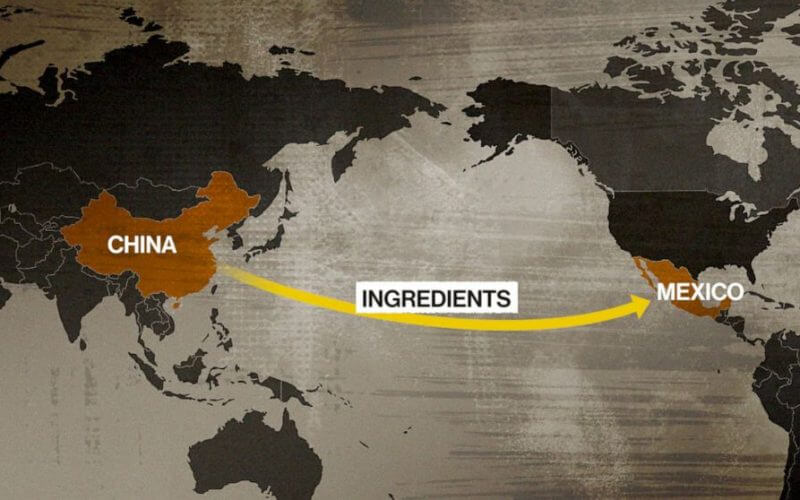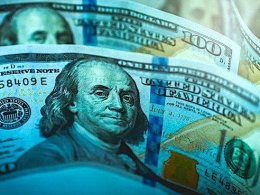As the United States’ southern border with Mexico continues to remain open as a result of the Biden administration's policies, drug cartels continue to pour into the country bringing in deadly and illegal drugs like fentanyl and synthetic drugs, prompting lawmakers and national security experts to warn of China's ever-increasing role in the drug trade.
According to the Brookings Institute, since 1999, synthetic opioids have resulted in the most devastating deaths in the U.S., killing over one million Americans. In 2012, the lethality rate increased significantly when Mexican Drug cartels obtained such drugs from Beijing.
According to the National Center for Health Statistics (NCHS), in 2021, around 106,699 Americans died from fentanyl, growing in 2022, with the death toll being around 107,477, according to the White House Office of National Drug Control Policy. Experts say that the consumption of fentanyl was through fake prescription pills, heroin, methamphetamine, and cocaine.
"China is involved in at least three different ways in fentanyl making, manufacturing, exporting fentanyl to Mexico either directly or indirectly, and providing the Mexican cartels with advice on how best to produce," explained Paul J. Larkin, a senior legal research fellow in the Meese Center for Legal and Judicial Studies at The Heritage Foundation and expert on criminal justice policy, drug policy, and regulatory policy.
In 2019, the Chinese government and the US collaborated in stopping the illegal drug trade, with Chinese authorities granting authority to the Drug Enforcement Administration (DEA) arrested a ring of fentanyl suppliers from the Northern City of Xingtai.
Following the past few years of deterioration in the relationship between the Chinese government and the US over Taiwan's independence and America's military presence in Asia, Beijing has declined to aid American officials in global counter-narcotic operations, announcing a complete suspension of any cooperation with US law enforcement last summer.
Today, Chinese actors have taken a significant role in the drug cartel business, laundering money to deadly Mexican cartels like the Sinaloa Cartel and Cartel Jalisco Nueva Generación (CJNG), who distribute their illicit drugs to the US.
Chinese money laundering brokers have successfully worked around American and Mexican banking systems through avenues like trade-based laundering, protected and unprotected marine products and wood, real estate, cryptocurrencies, casinos, and bulk cash.
Experts say that small and mid-level workers in Chinese chemical and pharmaceutical industries appear to be the main perpetrators in providing the resources and knowledge for Mexican drug cartels.
These workers are well connected with members of the Communist Chinese Party
(CCP), obtaining bureaucratic protection and other special privileges. Additionally, Chinese criminal syndicates have aided in the fentanyl crisis facing no repercussions from Beijing due to their political capital with Chinese authorities and government officials and the promotion of Beijing's political, military, and economic goals.
"China is not only going to purchase the groceries, but it is also preparing the recipes for the drug cartel cook to use," Larkin told The Foreign Desk.
"Beijing participates in the money laundering aspect of drug trafficking. The money that the cartels send to China from their drug trade, Beijing then launders it. They certainly remain involved in the fentanyl problem that the US has," Larkin said
The drug operations conducted by several Chinese criminal actors include small-family-based groups to businesses that engage in highly diverse legal trade with organized crime groups.
When confronted about the issue, Chinese officials reject involvement with the Mexican drug cartels, emphasizing that such an issue should be directed at American and Mexican customs authorities. The Communist government in Beijing has maintained this position despite Chinese criminal actors in Mexico who have engaged in money laundering and illegal transfers of wildlife products for synthetic drug creators.
Last week the Washington Post reported that US officials announced several indictments against four Chinese nationals, Chinese chemical firms, and Mexican cartel bosses for fentanyl production. One of the firms targeted by US prosecutors includes the Wuhan Shuokang Biological Technology firm dispensed technical assistance and advice to the Sinaloa Cartel, providing knowledge on specific chemicals to make synthetic drugs.
The indictments were unsealed in the Southern District of New York, displaying the chemical trail from the Wuhan province in China going through ports in Berlin and the US before they reached drug cartel "cooks" working in Northern Mexico.
The indictment labeled China as the "source of the vast majority" of precursor chemicals used by the Sinaloa Cartel and others to make fentanyl, naming leaders of the "Chapitos" network, including alleged Drug Kingpin Ovidio Guzman Lopez, who was arrested by Mexican security forces in January.
In response to China's actions in the fentanyl crisis, the Biden White House said that Beijing needed to strengthen regulations that would allow the government to know who is purchasing the chemicals and their purpose. The administration has done very little against the Chinese government, with White House officials hoping to work with Beijing on climate change and economic-related issues.
Experts say the US can push China to have stricter regulator standards and enforcement concerning their chemical and pharmaceutical industry by denying officials visas if their companies fail to adopt such laws.
Larkin and other experts note that one of the things the US could do is strengthen its border security by building the border wall.
"We have to figure out a way to persuade fewer people to use them because we are starting to see a shift from plant-based to synthetic drugs. We will see more synthetic drugs created that create problems for our society," Larkin said.
Asked about the fentanyl crisis impacting young Americans in high school and college, Larkin noted that "a large number of college-age students don't realize that era of drug experimentation is over."
In the 1960s and 1970s, it was the case that people could experiment on drugs, and the worst that would happen is they would feel mentally and physically unwell," Larkin said.
"Experimentation can lead to immediate death because the cartels are manufacturing counterfeit pills that look like other types of pills, or they might look like medicine used for ADHD. High school and college-age students purchase these from friends and do not realize they are entirely lethal," Larkin stated.
Regarding what the federal government should do about this issue, Larkin explained that it should "use every resource it has to educate the public by providing public service announcements that these drugs can kill."
"The administration won't do that because they don't want to say something that will antagonize the constituents who want to use drugs," he told The Foreign Desk.
"This administration is not discouraging people in their teens and twenties from using drugs and not educating them about their effects. Many teens think that if they do not know someone who used a drug and died, they will not think it will not happen to them. This administration has not said in the age group that they should not use drugs, and there is no good reason they have done that," Larkin added.
Larkin went on to say that having top US officials educate young Americans about the dangers of fentanyl and other illicit drugs is necessary, cost-free, and would save lives.
Related Story: Democrat Politicians Join Republican Lawmakers in Blaming China for Fentanyl Crisis










